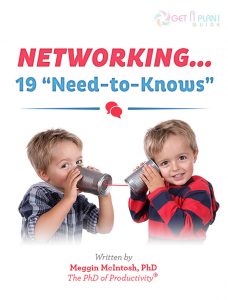Top Ten Tips for Effective Communication by Meggin McIntosh, PhD
 While it is impossible to teach a person to be an effective communicator in the two minutes it will take you to read this email, there are certain commonalities that effective communicators possess. Ask yourself whether you and your team think strategically about the following when you communicate:
While it is impossible to teach a person to be an effective communicator in the two minutes it will take you to read this email, there are certain commonalities that effective communicators possess. Ask yourself whether you and your team think strategically about the following when you communicate:
- With whom are you communicating? Have you considered such elements as age, gender, language barriers, and previous interactions with this person?
- What is the situation? For example, is the communication basically positive or negative?
- Have you set aside sufficient time for this communication? Think back to previous communication events similar to this one, make your best estimate, and then allow additional time reserves (also known as ‘pockets’).
- Is this a “telling” communication or is it a “requesting/sharing” communication? In the former, the task at hand is to tell someone else information and in the latter, you need information that someone else has. Clarifying which type it is gets you in the right frame of mind.
- Are you prepared to change your mind during the course of the communication? Do you expect the other person to change his/her mind? If you are headed into the interaction with a closed mind, question yourself – and if you are expecting the other person to be open, just ponder that.
- Is the purpose of your communication to inform, persuade or entertain? Each of these involves a different mindset and it’s helpful to think about your purpose prior to your meeting or other encounter, when possible.
- What exactly are you trying to say? Consider writing it down and being as succinct as possible; it will help you clarify in your own mind. Bill Jensen suggests that we consider what we want others to Know, Feel, and Do as a result of our writing and speaking. This is a powerful concept to consider.
- Why are you trying to say what you’re saying? Was the communication your idea or someone else’s?
- What are you hoping to accomplish as a result of the communication? Be clear on your ‘intention’ and stay focused on that.
- Do you have an “agenda” (either hidden or overt)? You need to tell yourself and you may very well need to tell the other person (people) with whom you are communicating.
Effective communication leads to productivity. Ineffective communication detracts from productivity (and from relationships, reputation, and so forth). It is worth the time and effort to think strategically through the questions above prior to your communications with others. Eventually, it will become second nature, but if it’s not at this point, then print out this list to have for handy reference.
© Meggin McIntosh, PhD (also known as “The PhD of Productivity”®). One of the ways that you can learn from Meggin about productive writing is through her 30 Articles in Just 30 Days program. Also, feel free to check out the learning tool “Tools, Tricks, Tips, Techniques, Tactics, & More for Propelling Your Writing Productivity.”
 And if you liked these tips then you will want the Get a Plan! Guide® to Networking. Networking is a far more important skill and practice than any of us can really comprehend. Years ago, it wasn’t necessary to know how to network because you knew who you knew – and that was all you needed to know. Today… that is far from true. Learn 19 Networking Need-to-Knows in this practical and specific guide which is part of the Get a Plan! Guides® series.
And if you liked these tips then you will want the Get a Plan! Guide® to Networking. Networking is a far more important skill and practice than any of us can really comprehend. Years ago, it wasn’t necessary to know how to network because you knew who you knew – and that was all you needed to know. Today… that is far from true. Learn 19 Networking Need-to-Knows in this practical and specific guide which is part of the Get a Plan! Guides® series.



